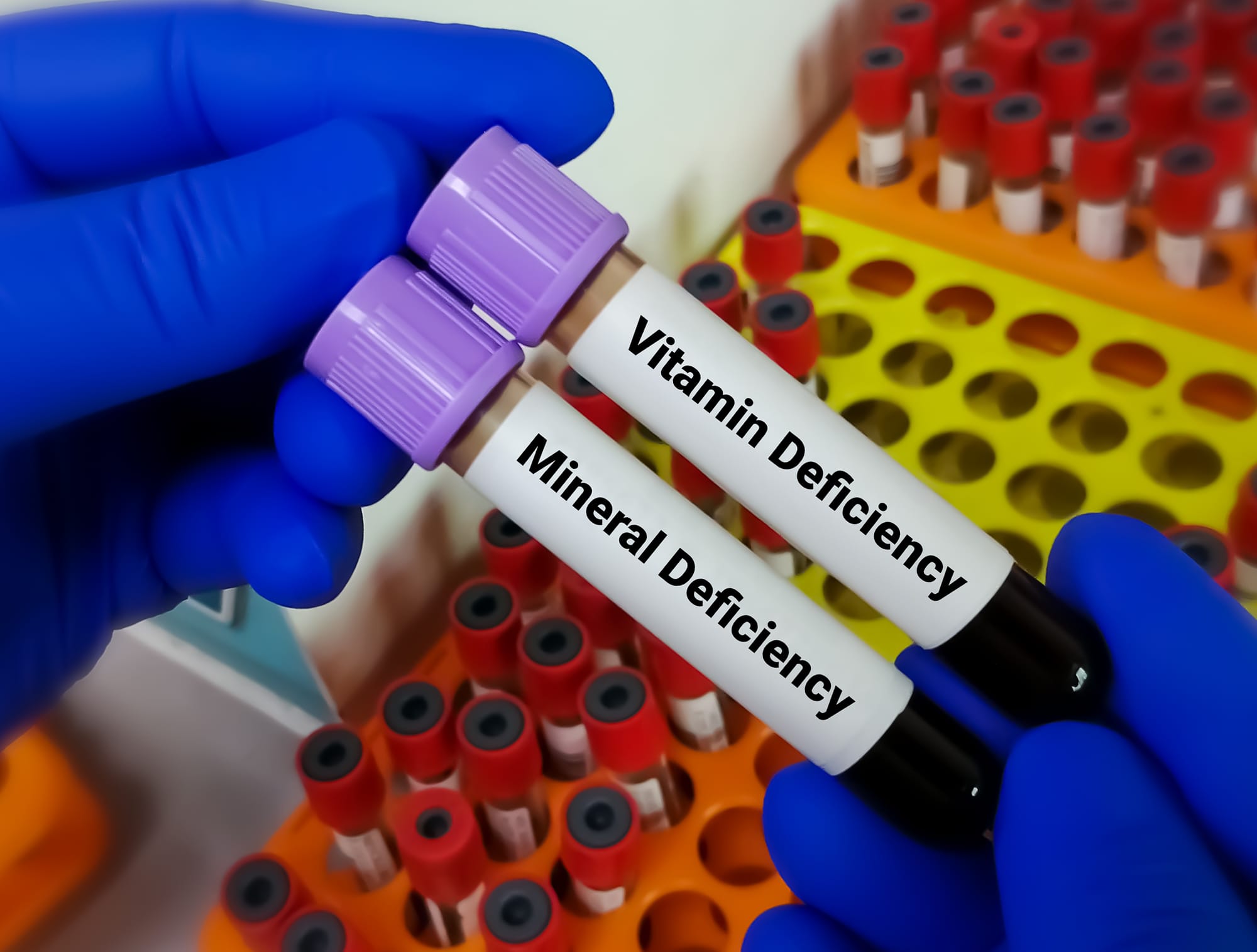Mineral and Vitamin Deficiency with chronic stress and trauma response.

In today's fast-paced world, chronic stress and trauma have become ubiquitous, often leaving a profound impact on our physical and mental well-being. When the body is under prolonged stress, it depletes essential vitamins and minerals at an accelerated rate, disrupting various physiological processes.
This nutrient depletion can exacerbate stress, creating a vicious cycle that further strains our health. Therefore, replenishing the body with crucial vitamins and minerals such as magnesium, calcium, zinc, potassium, B vitamins, vitamin C, and sodium is paramount to restoring balance and supporting overall well-being.
Replenishing these nutrients is not merely about addressing deficiencies; it's about fortifying the body's resilience against the detrimental effects of stress. Magnesium, for instance, is vital for muscle and nerve function, yet it is one of the first minerals to be depleted during stress.
Similarly, calcium, which is crucial for bone health and nerve signaling, can be excreted in higher amounts under stress, leading to long-term bone density issues. By ensuring an adequate intake of these and other essential nutrients, we can support our body's natural stress response mechanisms, enhance immune function, and promote mental clarity, ultimately fostering a state of holistic health even in the face of adversity.
Here are 10 symptoms of deficiency for the mentioned minerals and vitamins:
1. Magnesium Deficiency
- Muscle cramps and spasms
- Fatigue and weakness
- Nausea and vomiting
- Loss of appetite
- Numbness and tingling
- Personality changes, anxiety, or depression
- Irregular heart rhythms
- Seizures
- Osteoporosis
- Migraines
2. Calcium Deficiency
- Numbness and tingling in fingers
- Muscle cramps
- Convulsions
- Lethargy
- Poor appetite
- Mental confusion and memory loss
- Weak and brittle nails
- Osteoporosis
- Dental problems
- Irregular heart rhythms
3. Zinc Deficiency
- Hair loss
- Diarrhea
- Delayed wound healing
- Eye and skin lesions
- Loss of appetite
- Impaired taste and smell
- Weight loss
- Immune dysfunction (frequent infections)
- Cognitive impairments
- Slow growth in children
4. Potassium Deficiency
- Weakness and fatigue
- Muscle cramps and spasms
- Constipation
- Palpitations and arrhythmias
- Tingling and numbness
- Breathing difficulties
- Mood changes and irritability
- Increased blood pressure
- Frequent urination and excessive thirst
- Nausea or vomiting
5. B6 (Pyridoxine) Deficiency
- Anemia
- Dermatitis and skin rashes
- Depression and confusion
- Weakened immune function
- Cracks and sores around the mouth
- Glossitis (swollen, inflamed tongue)
- Irritability
- Seizures
- Peripheral neuropathy (nerve damage causing pain or numbness)
- Insomnia
6. B12 (Cobalamin) Deficiency
- Anemia (megaloblastic anemia)
- Fatigue and weakness
- Constipation
- Loss of appetite
- Weight loss
- Numbness and tingling in hands and feet
- Memory problems and cognitive difficulties
- Mood disturbances (depression or irritability)
- Glossitis and mouth ulcers
- Balance and coordination issues
7. Vitamin C Deficiency
- Fatigue and weakness
- Frequent infections
- Slow wound healing
- Swollen and bleeding gums
- Joint pain and swelling
- Dry, scaly skin
- Easy bruising
- Nosebleeds
- Anemia
- Scurvy (severe deficiency) leading to severe pain, swelling, and bleeding
8. Sodium Imbalance (Deficiency/Hyponatremia)
- Headache
- Nausea and vomiting
- Fatigue and low energy
- Muscle weakness, cramps, or spasms
- Confusion or disorientation
- Seizures
- Loss of consciousness or coma (in severe cases)
- Restlessness and irritability
- Appetite loss
- Difficulty concentrating
Replenishing these vitamins and minerals through a balanced diet or supplements is crucial to maintaining optimal health and preventing these symptoms, especially under conditions of stress and trauma.
Here Is a more complete list of the essential vitamin and minerals and their functions/mechanismsr:

1. Magnesium
- Mechanism: When the body experiences stress, the hypothalamic-pituitary-adrenal (HPA) axis is activated, resulting in the release of stress hormones such as cortisol and adrenaline. These hormones increase the excretion of magnesium through the kidneys. Magnesium is also a cofactor for numerous enzymes, including those involved in the synthesis of neurotransmitters (e.g., serotonin, dopamine) and energy production (e.g., ATP). During stress, the demand for these neurotransmitters and energy increases, thereby increasing the utilization and depletion of magnesium.
2. Calcium
- Mechanism: Chronic stress leads to elevated levels of cortisol, which can interfere with calcium absorption in the intestines by reducing the efficiency of vitamin D, a key regulator of calcium absorption. Additionally, cortisol can increase the renal excretion of calcium. Prolonged elevated cortisol can also stimulate the release of parathyroid hormone (PTH), which mobilizes calcium from the bones to maintain blood calcium levels, leading to potential bone density loss over time.
3. Zinc
- Mechanism: Zinc plays a crucial role in immune function, DNA synthesis, and cellular repair. During stress, the body's immune response is heightened, increasing the demand for zinc. Stress hormones, particularly cortisol, can increase the urinary excretion of zinc. Zinc is also a cofactor for superoxide dismutase, an enzyme involved in antioxidant defense. The increased oxidative stress during trauma and chronic stress further depletes zinc levels as it is used up in antioxidant processes.
4. Potassium
- Mechanism: The body's response to stress involves the activation of the renin-angiotensin-aldosterone system (RAAS). Aldosterone, a hormone released in this pathway, promotes sodium retention and potassium excretion in the kidneys. This mechanism helps maintain blood pressure and fluid balance under stress. However, chronic stress can lead to sustained aldosterone release, causing prolonged potassium excretion and potentially resulting in hypokalemia (low potassium levels), which can affect muscle and nerve function.
5. B Vitamins
- B6 (Pyridoxine)
- Mechanism: Pyridoxine is involved in over 100 enzyme reactions, mainly related to protein metabolism. It is also crucial for the synthesis of neurotransmitters such as serotonin and GABA, which regulate mood and stress response. During stress, the increased production of stress hormones like cortisol requires more pyridoxine, depleting its stores. Additionally, the metabolic rate increases under stress, heightening the demand for B6.
- B12 (Cobalamin)
- Mechanism: Cobalamin is essential for red blood cell formation, DNA synthesis, and neurological function. Stress can reduce stomach acid production, which is necessary for the absorption of B12 from food. Moreover, the increased cellular turnover and repair demands during stress elevate the need for B12. Chronic stress can also affect the production of intrinsic factor, a protein required for B12 absorption in the small intestine.
6. Vitamin C
- Mechanism: Vitamin C is a key cofactor in the biosynthesis of cortisol from cholesterol in the adrenal glands. During periods of stress, the adrenal glands produce more cortisol, increasing the demand for vitamin C. Vitamin C is also a potent antioxidant, scavenging free radicals generated during the stress response. The increased oxidative stress during trauma and chronic stress depletes vitamin C levels as it is used to neutralize these reactive oxygen species.
7. Sodium
- Mechanism: Acute stress activates the sympathetic nervous system and the renin-angiotensin-aldosterone system (RAAS), leading to the release of aldosterone. Aldosterone promotes sodium retention in the kidneys to maintain blood pressure and fluid balance. Chronic stress, however, can disrupt this balance. For example, prolonged stress can lead to either excessive sodium retention, contributing to hypertension, or inappropriate sodium loss, depending on the individual's physiological response. This dysregulation can impact overall fluid and electrolyte balance, affecting cardiovascular and kidney function.
Understanding these detailed mechanisms underscores the importance of maintaining adequate levels of these essential nutrients, especially during periods of prolonged stress or trauma, to support the body's physiological functions and mitigate the adverse effects of stress.
Tips:
When it comes to my experience the best way to absorb some of these essential minerals and vitamin especially with assimilation issues with certain body types and the best vehicle for them, are some recommendations:

- Magnesium chloride baths and topical application through the skin is best. Pouring a hot bath, or soaking you feet and applying magnesium oil on the skin is the best medium whilst also taking it orally. I usually recommend taking 2 full cups of salts and one cup of baking soda and taking a bath for 30 minutes for best effects. Spraying the oil around the kidneys, neck and affected areas of pain/tension helps too.
- Methylated form of B vitamines is best as the body does not need to convert it for those who are struggling with assimilation.
- Liquid trace minerals in your water bottle is the best habit you can have and I personally do so. Another way is to create salt brine overnight and putting a teaspoon of the unrefined salt/water mixture in your bottle of water.
- Making juices with organic fruits that are high in Vitamin C . You not only getting the vitamin c but other trace elements.
- Diet of course can play a cruicial role and I encourage people who under trauma response condition, chronic stress and inflammation to abstain from, sugar, caffeine, wheat, dailry and alcohol.
- Medicinal mushrooms powders mixed with real cacao powder, raw honey and coconut, or other nut milk twice a day. For energy, immune boosting, reducing inflammation and cognitive function; whilst increasing production of stem cells.
- Swimming in ocean, lakes, hot springs and mud baths bring many of the essential minerals into the body whilst calming the nervous system.